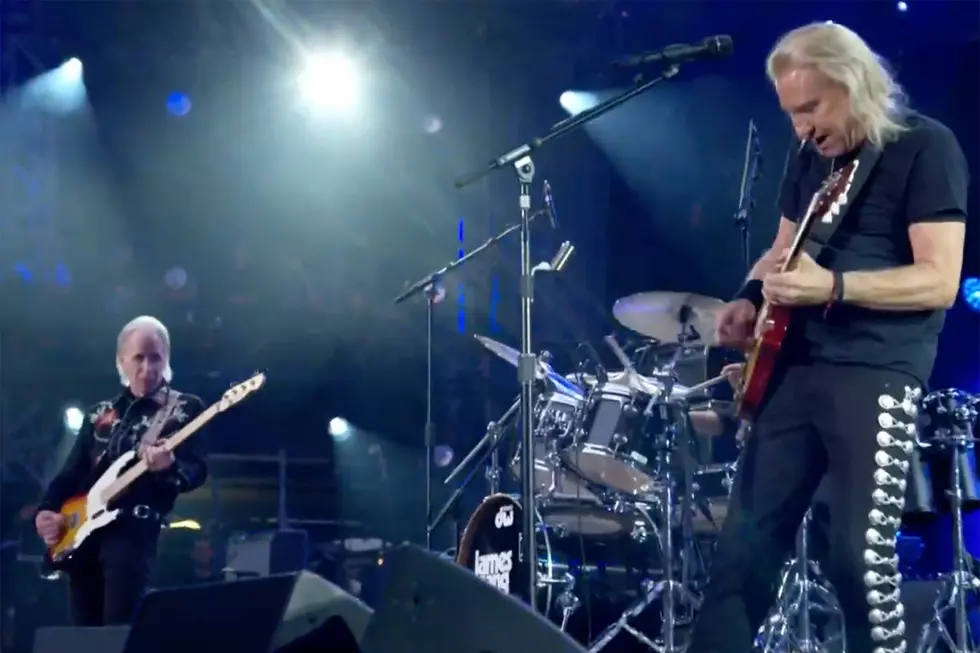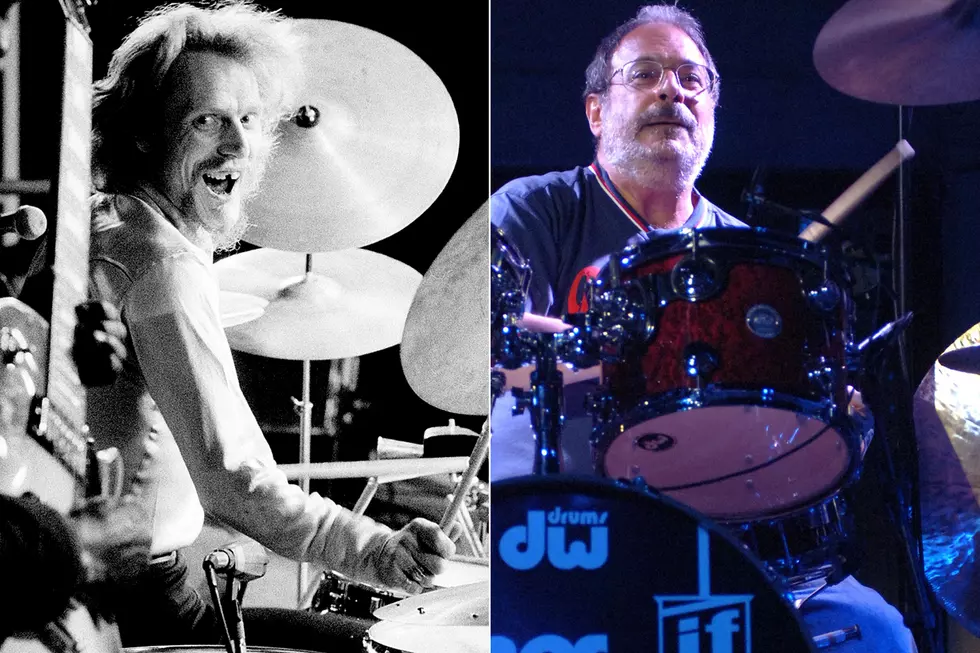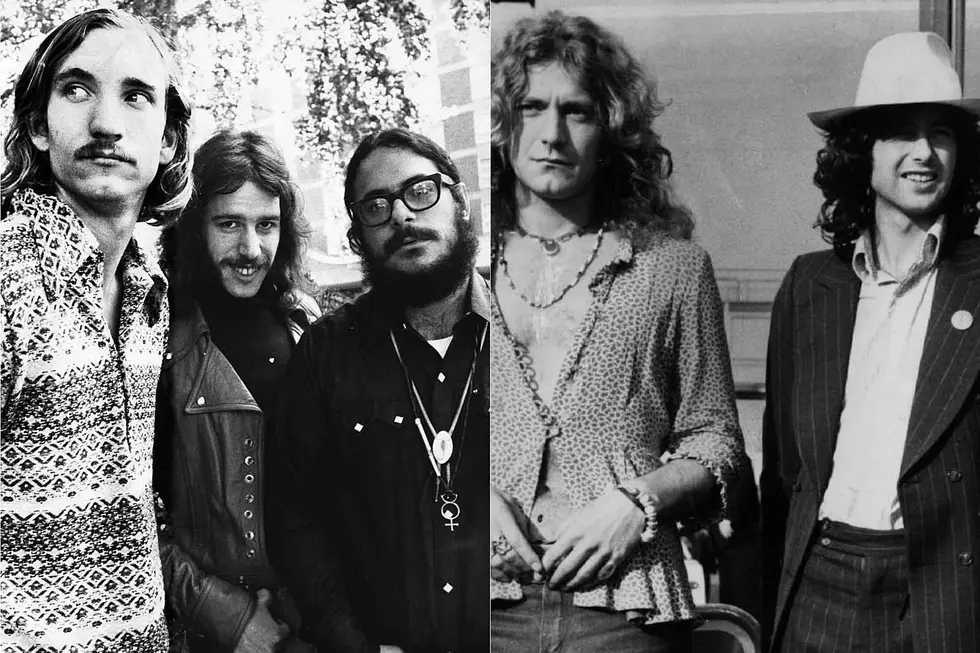
How James Gang Brought ‘Rides Again’ Out of Chaos
On record, the James Gang excelled at wresting rock 'n' roll glory from the jaws of seemingly certain chaos. That's exactly what they did behind the scenes during the months leading up to the release of their second album, 1970's James Gang Rides Again.
Label expectations were fairly minimal for James Gang Rides Again, which arrived a little more than a year after the group's debut, Yer' Album. But if following up their first record was feasible from a sales standpoint, it proved a far more complicated prospect in terms of establishing just who was in the James Gang — starting with the abrupt departure of bassist Tom Kriss, who James Gang drummer Jimmy Fox says tendered his resignation before Yer' Album had even arrived in stores.
"He just spilled his guts," Fox tells UCR's Matt Wardlaw of a band meeting called after he and Joe Walsh realized Kriss "hadn’t said shit in six months." Fox remembers Kriss saying: "'I hate this band. I hate the music we’re making. I don’t think I can play it anymore.' Joe and I were blindsided. You know, it was like, he was, I thought, a very fine player. 'Tom, aren’t you somewhat equally responsible for the music we’re making? What do you want to do?' 'Well, I don’t know, but I can’t take this anymore.'"
Fortunately, Fox knew just who to call: Dale Peters, who had replaced him in a college band at Ohio State University a few years before. Peters was drumming at the time, but he'd since picked up the bass — and Fox happened to know he was at loose ends with his own group, the Case of E.T. Hooley.
"I said, 'What are you doing? I know the band is not doing well.' He said, 'Yeah, we’ve kind of split up. I was thinking of going back to school,'" Fox recalls. "I said, 'Well, there’s a situation here. We have an unhappy bass player, who I think we’re going to have to replace. Why don’t you come down tonight after the gig and we’ll play for a while?' And he did and it was magic. It was instantaneously an upgrade, which we never expected. It was like, 'Well, Tom’s got his wish.' The next day, we sat Tom down and we said, 'Tom, you know, we talked to Dale Peters, another bass player, and you’re free to go.' He goes, 'Wow, thanks man, that’s a load off my mind.' Literally, the following night, Dale was in the slot and we never looked back."
"We could just play instantly," Peters adds. "I mean, we had the same record collections, we liked the exact same kind of music — we could just play. We can still do it. If we got together tomorrow, it would just work. It just works, I don’t know why. We’re completely different people and we never really hung around together, but we could always play together. So it was great. It was great fun. It was easy. It was fabulous. It was just natural right from the beginning."
Peters' addition was an obvious fit for the James Gang, but the same could not be said for vocalist Kenny Weiss, who was briefly brought in to try and relieve Walsh from the double duty of singing and playing guitar. As Walsh says, he only took over vocals for the band because the group's last singer quit the night of a gig.
"I couldn’t sing — well, I didn’t sing — I had never been a lead singer. I just played guitar, but I sang a lot better than the other guys," Walsh tells Wardlaw. "We got a standing ovation and an encore, and we got gas money to go home. When we got home, we looked at each other and said, 'Well, do we really need anybody?' We just decided we’d do it as a three-piece, and that was really the beginning of the James Gang. But I never would have learned how to play and sing if I didn’t have to — then I never would have been the singing guitar player unless I had to, but I had to and so I did. That’s the reason for my style, which is kind of Pete Townshend-ish. It’s kind of 'lead rhythm' in the James Gang. I’m grateful that happened, because being in a three-piece band, there’s nothing better on a good night. And on a bad night, there’s nothing worse."
Walsh was upfront about being uncomfortable being the James Gang's lead singer. "Joe comes to a gig one day and says, 'I’ve been thinking. I’m not up for this job as a lead singer. I’m no good,'" Fox says with a laugh. "I said, 'I’m not sure what to say.' He said, 'Look, I’m not fooling anyone — I have an odd voice. I think I might be stronger concentrating on the instruments. Who do you know?'"
Listen to the James Gang's 'Funk #49'
Walsh is a fine singer, but as Peters points out, he's a truly singular guitarist. "Joe’s a phenomenal acoustic player. You know, there’s guitar players that are great electric or great acoustic or great slide [players]. Joe is the only guy I know that’s a phenomenal slide player, a phenomenal acoustic player, a phenomenal electric player," Peters enthuses. "He’s the only guy I know who does all three about as well as they can be done. And I’m comparing him to everybody, you know, Clapton and everybody else. I mean, Joe ... man, he can play."
Fox turned to his grade school buddy Weiss after his conversation with Walsh, and invited him out to sing with the James Gang — a gig that lasted about as long as it took Weiss to track a couple of cuts for Zachariah, a movie that James Gang producer Bill Szymczyk was working as the music director. The band members were hired to perform the songs in the film, but by the time the cameras rolled, Weiss was already out of the lineup — a decision Fox says started with Walsh and manager Mike Belkin.
"The hardest call of my life was at 4 in the morning, calling Kenny at his house and saying, 'Kenny, don’t get on the airplane,'" Fox says. "He sued us for $50 million — a whole big bullshit thing." Fox remembers that Szymczyk, unnerved by the lawsuit, offered to mix the band's next album for free if he settled with Weiss, so he did what he had to do.
"We settled for literally pocket money. It was so embarrassing and so sad. I literally took my share out of my pocket to pay the settlement, and it was a couple of hundred dollars I probably had," Fox says. "It was stupid, just stupid. And at a certain point, his attorney knew that and knew it was time to cut bait."
Firmly resettled as a power trio, the James Gang entered the studio to record Rides Again — but first, they booked a spring 1970 U.S. tour opening for the Who at the personal invitation of Townshend, who Szymczyk guesses had been infected by the "amoebic success" of Yer' Album.
"Townshend heard them and put them on a Who tour opening for them, and that’s all it took in those days and they were on their way," Szymczyk tells UCR's Wardlaw. "So when it came time for Rides Again, they had ... especially Walsh, he had a giant head full of ideas. I don’t mean a giant head, but he had a head full of ideas."
Peters says the James Gang "learned a ton from Pete. You know, when the Who played back then, I used to love to watch the people in the first row – because when they started playing, it was like an avalanche. These people, the energy would just blow them back in their seats. It was incredible, and it was great to watch because they would always start full-tilt."
Fox actually recalls the band having merely "a couple of ideas" for Rides Again when the recording process started, but Szymczyk saw a group firmly positioned to take a step forward. Looking back, he identifies a few key ingredients, starting with the addition of Peters and including the new — and eventually signature — James Gang songs "Funk #49" and "The Bomber."
"I liked Dale immediately, and he had a much better personality. They were prepared. They had played for a year on the road and their chops were really up," Szymczyk recalls. "Walsh had a bunch of ideas and ... 'The Bomber' they were playing live. They had put that together themselves on the road and it was like, 'Oh my God, that’s just amazing.' 'Funk #49' was initially their warm-up that they would do in sound check, just a riff that they’d jam on and then Walsh wrote six lines and that was the end of it," he laughs. "The story of 'Funk #49' is six lines and a great guitar lick."
Fox adds: "With Dale on the same page, there didn’t seem to be direction issues. It all seemed to be pulling in the same direction and that was very helpful during those days, because it went together more easily. Joe for instance, was less likely to say, 'Listen, Tom, I want you to do this; Jimmy, I’d like you to do this,' because what we were playing was organically more naturally right to us all."
Listen to the James Gang's 'Asshtonpark'
Peters says the James Gang saw a turning point in its audience at the gigs leading up to the Rides Again sessions, which fed into the energy surrounding the sessions.
"We were doing real well in the clubs, and you could do that back then. You could show up at a club and put 700 people in, just jammed to the rafters," Peters says. "When I knew things were different, we played somewhere in Pennsylvania, maybe Beaver Falls — some college — and we played at the field house, and I think we had a $1,500 guarantee against the door. The guy expected a thousand people, and that would have been a good crowd for back then. When we showed up, there were 7,000 people. And it was like, 'Who are they here to see?' To me, that was the gig that turned everything. After that, we were surprised at how well we started doing, quickly."
Amid all the growing buzz, the members of the James Gang found time to buckle down and write new material for the next record. "We jammed in the dressing rooms before each show, so that’s kind of where it all came from. All of those riffs and all of those little things we had thought about month after month, just to get warmed up – they turned into tunes," Peters adds. "I mean, it was easy. Bill got a great sound and he was really great to work with. You know, he was really loose and never said, 'No, we can’t do that' or 'We don’t want to do that.' We could do whatever we wanted."
Walsh says they "recorded at a studio called the Record Plant in Los Angeles — it now is legendary. Stevie Wonder got the studio next to us and was in there for a month. Marvin Gaye was in another studio for two weeks. Everybody was recording at the Record Plant. ... It was a brand new studio and it was state-of-the-art, and being in that environment creatively was like a B-12 shot. We didn’t know how to record, but we could do anything we wanted, so we did. We tried a bunch of stuff out and a lot of that was not knowing exactly what we wanted to do, but just, 'Well, why don’t we do this?' 'Okay.' And then we’d record it. That’s what's special about Rides Again. When you know how to make records, you do it totally different."
As Fox tells the story, one of those "totally different" moments included the recording of the Rides Again instrumental track "Asshtonpark," which he says was named in honor of Zachariah production designer Assheton Gorton and the night the band got him "good and high."
"We were popping cassettes in and out, just to have music to listen to while we were hanging out and talking and eating potato chips or whatever it was. The spool slipped on the cassette and started coming out of the machine," Fox says. "We thought that was funny, so Bill grabbed the tape and he strung it around the lamp and then he strung it around Assheton’s foot and then he strung it around my neck, and then he took it over to Joe and strung it around a finger and took it over to Dale and then to another lamp and then to the bedpost, and this and that. We made a jungle of cassette tape out of our hotel room. When we were done, no one could move and we were all stuck in this thing and we looked around. Bill said, 'What do we call it?' One of us looked at Assheton and said, 'This is Assheton Park.'"
Lest that create the impression that the Rides Again sessions were defined by goofing around, Bill Szymczyk is quick to note that much of the record was very deliberately crafted — right down to the sequencing, which split the album between "electric" and "acoustic" sides.
"That was kind of the game plan from the get-go," Szymczyk says. "The way that I always like to sequence stuff is that you have a hard hitter in front: You’ve got a good lead-off man, and it’s got to be short and to the point and it's got as much of what the band is about as you can put into the first song. ... When you’re at the end of almost 20 minutes, then you’ve got to have a great closer — you’ve got to close out the first half. And then the same on the other side, you’ve got to open big and you’ve got to close strong. The four corners, as I used to call them, would take care of themselves. Then it was strictly a matter of filling in the blanks."
A big "blank" was filled with "The Bomber," which took up more than seven minutes of Rides Again's 35-minute running time, and ended up spawning a couple of classic James Gang stories in the process. It also triggered a decades-long copyright battle, paving the way for the invention of industry-standard speakers in the bargain.
"The guy who owned the Record Plant had just put in these new expensive monitors, and Bill was the first guy to use them – which was a real mistake, because you know, Bill’s original [motto was] 'Made Loud to Be Played Loud,'" Peters tells Wardlaw, with a laugh. He specifically recalled a moment during "The Bomber" playback when "the speaker just physically blew out of the wall."
"We blew eight of those speakers up," Szymczyk adds. "The next day, [Record Plant co-founder] Gary Kellgren went to his maintenance guy – his head tech, who was Tom Hidley – and he said to Tom, 'Make me a monitor that Szymczyk can’t blow up!' That was the birth of the Hidley monitor, which is in hundreds of studios around the world at this point."
Listen to the James Gang's 'The Bomber'
In addition to speaker-destroying frequencies, "The Bomber" also included a passage from Ravel's "Bolero," which ended up costing the James Gang a fair bit of legal drama. "Ravel was French, and French copyright law and French law in general is insane," Walsh recalls. "The French copyright, Ravel’s heirs and Ravel’s estate stipulated in the French copyright law that the piece had to be played in its entirety, top to bottom. You could never play little parts of it, and it had to be played by the full orchestra that it was written for. Well, we didn’t know that!"
The band members were forced to remove the offending portion from the song, but it was eventually restored when The James Gang Rides Again made its way to compact disc. "The copyright length ran out," Walsh explains. "It was like 60 years or something and it got to the point where it was 60 years and it kind of became – you know, at the time, this was for albums. CDs didn’t exist when they wrote the law. So when CDs replaced the albums as a format, there’s nothing that said we couldn’t do that!"
When sessions wrapped for Rides Again, Fox says the James Gang was ready to conquer whatever came next. "We felt we were going from a position of strength. When we were working on the record, it felt very much like we were pulling in the same direction. It felt very much like we were doing positive things," Fox adds. "When it was finished, we think we did it well. Our attitude was, 'We’ve accomplished it.'"
Unfortunately, that didn't translate to a ton of chart success. Future FM standard "Funk #49" was a minor hit, peaking at No. 59, but James Gang Rides Again wasn't the game-changer the band needed at that point — particularly for Walsh, who was tiring of the grind that chewed up countless bands at their level during the '70s. This iteration of the group managed to muddle through two more releases — Thirds and James Gang Live in Concert, both released the following year — before Walsh tendered his own resignation.
"Joe came to us and said, 'Look, I’m hearing way more than we’re playing and I’m hearing stuff that requires keyboards and horns and extra stuff. The way we’re structured, I can’t do both at once. I can do both — but I can’t do them at the same time,'" Fox says. "'I’m going to leave the band. I’m going to finish the year with you; I’m not pulling any power play.' He couldn’t have been more upright about it. He gave us a good five or six months."
Fox admits he didn't view Walsh's departure as a "life-altering" development. "I was egotistical about the band," he says, with a laugh. "I even called Pete Townshend, and I said, 'Pete, what do you think?' He said, 'Man, get yourself a kick-ass guitar player and you’re all set.' Well, he was wrong and I was wrong."
The James Gang continued to soldier on for awhile, releasing six more albums with a shifting lineup that at one point included Tommy Bolin, but they never managed to recapture the spark they'd struck with Rides Again — a missed opportunity Peters still rues.
"It was horrible," he says of Walsh's departure. "It was like going to the electric chair. It was like, 'Now what?' – because it was all working. Everything was working. We had found our sound; we had a good recording thing going. We had the right agents. You know, all of this stuff was in place."
The James Gang have since reunited with Walsh on a handful of occasions, playing assorted dates and even reconvening in the studio to re-record old songs, but they've never come close to rebuilding the momentum they had going into Rides Again. Looking back, Szymczyk agrees the album remains their defining statement.
"You have to understand, this is my first hit band that I found and discovered, signed to the label. You know, these guys were my baby. So yeah, I was like, 'Oh goodie, I’ve got my Beatles,' you know? 'I’ve got my Led Zeppelin. I’ve got my something.' I thought we would be at it for a long time," he adds, with a laugh. "That was it. That was it — that was the great James Gang album. Period."
Rock's Most Disappointing Albums
Six Little-Known Eagles 'Hotel California' Facts
More From Ultimate Classic Rock









